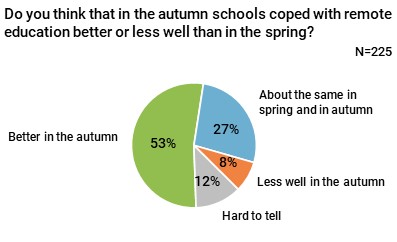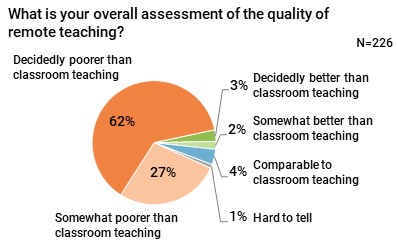07/2021
2021-02-18
What Parents Think of Remote Education
In a survey of the parents of children learning remotely, just over half were of the opinion that schools coped with remote education better in the autumn of 2020 than they had in the spring. About one in four thought it was about the same, while relatively few said they managed less well.

|
Despite the perceived improvement in schools’ preparedness for remote learning, parents generally considered the quality of online education to be inferior to what takes place in the classroom. An overwhelming majority thought that the quality of remote teaching was poorer and well over half considered its quality to be much worse. Few were of the opinion that it was comparable or actually better.

|
More on this subject in the CBOS report.
This ‘Current Events and Problems’ survey (368) was conducted using a mixed-mode procedure on a representative sample of named adult residents of Poland, randomly selected from the National Identity Number (PESEL) register.
Respondents independently selected one of the following methods:
– Computer Assisted Personal Interview (CAPI);
– Computer Assisted Telephone Interview (CATI), respondents receiving researchers’ telephone numbers in an introductory letter from CBOS;
– Computer Assisted Web Interview (CAWI), where respondents filled in the online questionnaire independently, gaining access by means of a login and password provided in an introductory letter from CBOS.
– Computer Assisted Personal Interview (CAPI);
– Computer Assisted Telephone Interview (CATI), respondents receiving researchers’ telephone numbers in an introductory letter from CBOS;
– Computer Assisted Web Interview (CAWI), where respondents filled in the online questionnaire independently, gaining access by means of a login and password provided in an introductory letter from CBOS.
In all three cases the questionnaire had the same structure and comprised the same questions. The survey was carried out between 4 and 14 January 2021 inclusive on a sample of 1150 people (44.1% using the CAPI method, 42.8% CATI and 13.1% CAWI).
CBOS has been conducting statutory research using the above procedure since May 2020, stating in each case the percentage of personal, telephone and internet interviews.





